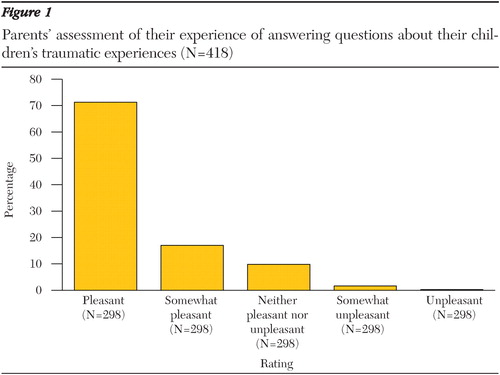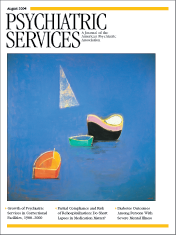Datapoints: Acceptability of Asking Parents About Their Children's Traumatic Symptoms
Little is known about the effectiveness of mental health interventions to help child trauma victims. Concerns about the ethics of asking children and their families about the children's traumatic experiences have hindered research in this area. Some studies have suggested that asking trauma victims about their experiences may increase their psychological distress (1), whereas others have shown that questioning does not significantly increase their distress (2). To understand the ethical issues, we measured the acceptability of asking parents of child trauma victims about their children's traumatic experiences.
As part of a larger study to assess the impact of a school-based mental health program in Los Angeles (3), 1,887 students in grades 3 to 8 completed self-report forms about violence exposure, posttraumatic stress disorder symptoms, and depressive symptoms. Parents of the 418 students who reported high rates of violence exposure and clinical levels of posttraumatic stress symptoms were interviewed about their children's emotions and behavior, their knowledge and beliefs about the effects of violence on children, and their attitudes toward mental health treatment. At the end of the interview, parents were asked to assess their interview experience with a 5-point Likert scale.
As Figure 1 shows, of the 418 parents who completed the interview, 369 (88 percent) reported that answering the questions was either a pleasant or somewhat pleasant experience. Only eight parents (2 percent) reported that it was either a somewhat unpleasant or unpleasant experience. Participating parents were primarily Latino (401 parents, or 96 percent) and female (337 parents, or 81 percent). No significant differences were found by parents' race or ethnicity, education level, marital status, or employment status or by the severity of the children's symptoms or the amount of violence that the children were exposed to.
These results are similar to those that have been found among adult victims of trauma. Providing trauma screening and services did not appear to induce distress among parents of children who had been traumatized by violence. The positive parental response has important implications for trauma-based services and research in the community and schools.
Ms. Dean and Dr. Stein are affiliated with RAND, 1700 Main Street, Santa Monica, California 90407 (e-mail, [email protected]). Dr. Jaycox is with RAND in Arlington, Virginia. Dr. Kataoka is with the University of California, Los Angeles. Ms. Wong is with the Los Angeles Unified School District. Harold Alan Pincus, M.D., and Terri L. Tanielian, M.A., are editors of this column.

Figure 1. Parents' assessment of their experience of answering questions about their children's traumatic experiences (N=418)
1. Templeton DM: Sexual assault: effects of the research process on all the participants. Canadian Family Physician 39:250–254, 1993Medline, Google Scholar
2. Griffin MG, Resick PA, Waldrop AE, et al: Participation in trauma research: is there evidence of harm? Journal of Traumatic Stress 16:221–227, 2003Google Scholar
3. Stein BD, Jaycox LH, Kataoka SH, et al: A mental health intervention for schoolchildren exposed to violence: a randomized controlled trial. JAMA 290:603–611, 2003Crossref, Medline, Google Scholar



